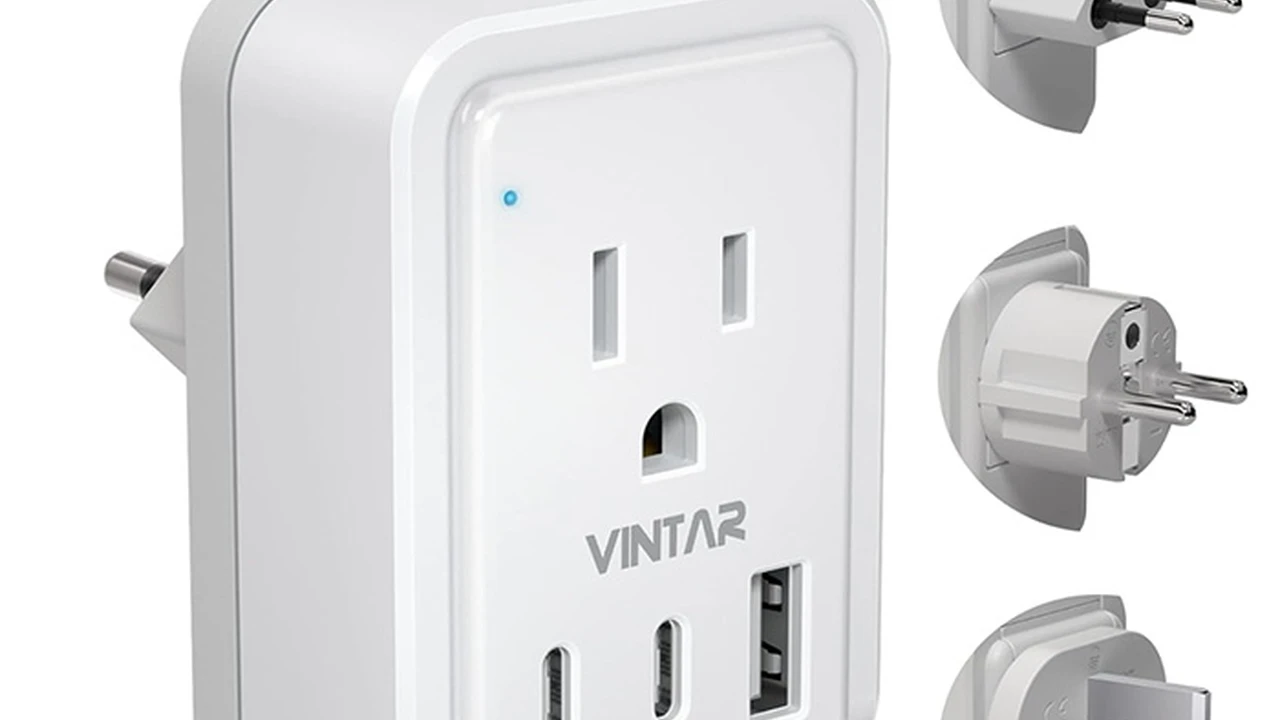Power Adapters Explained
Safeguard your data with reliable cloud storage options. This guide reviews top cloud storage providers based on security, storage capacity, and pricing. Protect your important files and access them from anywhere.

Why Cloud Storage Matters for Digital Nomads Secure Data Backup
Okay, let's face it: as a digital nomad, your life is basically on your laptop, phone, and maybe a trusty tablet. Photos, client documents, that killer presentation – it's all there. Now, imagine losing that device. Heart attack, right? That's where cloud storage swoops in to save the day (and your sanity). Think of it as your digital safety deposit box, accessible from anywhere with an internet connection. It's not just about backing up your stuff; it's about peace of mind. You can work, create, and explore knowing your precious data is safe and sound, even if your laptop decides to take an unscheduled swim in the ocean.
Key Considerations Choosing Cloud Storage Security Pricing Storage Capacity
So, you're sold on cloud storage. Awesome! But hold your horses before you blindly sign up for the first service you see. There are a few things to consider to ensure you're getting the best bang for your buck (and the best protection for your data):
- Security: This is HUGE. You want a provider that takes security seriously. Look for features like encryption (both in transit and at rest), two-factor authentication, and data centers with robust physical security. Read their privacy policy carefully to understand how they handle your data.
- Storage Capacity: How much space do you realistically need? Consider the size of your photo and video libraries, the amount of documents you store, and whether you plan to back up your entire computer. Don't overpay for storage you won't use, but also don't skimp and run out of space halfway through your trip.
- Pricing: Cloud storage plans come in all shapes and sizes, with prices ranging from free (with limited storage) to hundreds of dollars per month. Compare the features and storage capacity of different plans to find one that fits your budget. Look for introductory offers or discounts for annual subscriptions.
- Ease of Use: Let's be real, you're a digital nomad, not a tech wizard. Choose a service with a user-friendly interface that's easy to navigate and understand. Look for features like drag-and-drop file uploading and automatic syncing.
- Syncing and Sharing: Make sure the service offers seamless syncing across all your devices, so you can access your files from anywhere. Also, consider how easy it is to share files with clients or collaborators.
- Customer Support: What happens if something goes wrong? Choose a provider with responsive and helpful customer support, ideally available 24/7. Check online reviews to see what other users have to say about their experience.
Top Cloud Storage Providers Digital Nomads Compared Pricing Features
Alright, let's dive into some specific cloud storage providers that are popular among digital nomads:
Google Drive Cloud Storage Collaboration Pricing Plans
Overview: Google Drive is a popular choice because it's integrated with other Google services like Gmail, Google Docs, and Google Photos. It's easy to use, offers generous free storage (15GB shared across Google services), and is great for collaboration.
Pros:
- Seamless integration with Google ecosystem
- Generous free storage
- Excellent collaboration features
- Easy to use interface
Cons:
- Privacy concerns (Google scans your data)
- Shared storage across Google services
Use Cases:
- Storing and sharing documents, spreadsheets, and presentations
- Backing up photos and videos from your phone
- Collaborating on projects with other Google users
Pricing:
- Free: 15GB (shared across Google services)
- 100GB: $1.99/month or $19.99/year
- 200GB: $2.99/month or $29.99/year
- 2TB: $9.99/month or $99.99/year
Dropbox Cloud Storage File Sharing Syncing Security
Overview: Dropbox is a veteran in the cloud storage game, known for its reliable syncing, file sharing capabilities, and user-friendly interface. It's a solid choice for individuals and teams who need to collaborate on files.
Pros:
- Excellent syncing capabilities
- Easy file sharing
- User-friendly interface
- Cross-platform compatibility
Cons:
- Limited free storage (2GB)
- Can be more expensive than other options
Use Cases:
- Storing and syncing important documents and files
- Sharing large files with clients or collaborators
- Backing up your computer
Pricing:
- Free: 2GB
- Plus: 2TB for $11.99/month or $119.88/year
- Family: 2TB for up to 6 users for $19.99/month or $199.92/year
Microsoft OneDrive Cloud Storage Office 365 Integration Pricing
Overview: If you're already using Microsoft Office 365, OneDrive is a natural choice. It's tightly integrated with Office apps like Word, Excel, and PowerPoint, making it easy to create, edit, and share documents. It also offers a decent amount of free storage (5GB).
Pros:
- Seamless integration with Microsoft Office 365
- Good value if you're already paying for Office 365
- Decent free storage
Cons:
- Less intuitive interface than Google Drive or Dropbox
- Can be confusing to manage storage across different Microsoft services
Use Cases:
- Storing and sharing Office documents
- Collaborating on documents with other Office users
- Backing up your computer
Pricing:
- Free: 5GB
- 100GB: $1.99/month
- Microsoft 365 Personal: 1TB + Office apps for $6.99/month or $69.99/year
- Microsoft 365 Family: 6TB + Office apps for up to 6 users for $9.99/month or $99.99/year
iCloud Drive Apple Ecosystem Storage Syncing Features
Overview: If you're all-in on the Apple ecosystem (Mac, iPhone, iPad), iCloud Drive is a convenient option. It's seamlessly integrated with Apple devices and offers features like automatic syncing of photos, documents, and settings.
Pros:
- Seamless integration with Apple devices
- Easy to use for Apple users
- Automatic syncing
Cons:
- Limited compatibility with non-Apple devices
- Can be expensive for large storage needs
Use Cases:
- Backing up your Apple devices
- Syncing photos, documents, and settings across your Apple devices
- Sharing files with other Apple users
Pricing:
- Free: 5GB
- 50GB: $0.99/month
- 200GB: $2.99/month
- 2TB: $9.99/month
pCloud Secure Cloud Storage Encryption Lifetime Plans Privacy
Overview: pCloud is a lesser-known but highly secure cloud storage provider that offers end-to-end encryption and lifetime plans. It's a great option for those who prioritize privacy and want a long-term storage solution.
Pros:
- Strong security and encryption
- Lifetime plans available
- Privacy-focused
Cons:
- Less well-known than other providers
- Can be more expensive upfront (for lifetime plans)
Use Cases:
- Storing sensitive data
- Backing up important files
- Sharing files securely
Pricing:
- Free: 10GB
- 500GB: $4.99/month or $47.88/year or $175 one-time payment (lifetime)
- 2TB: $9.99/month or $95.88/year or $350 one-time payment (lifetime)
Real-World Scenarios Digital Nomad Cloud Storage Usage
Let's paint a picture of how these services might be used by different digital nomads:
- The Photographer: A travel photographer with tons of high-resolution photos and videos would benefit from a service like pCloud or Google Drive with a large storage plan (2TB or more). They'd use it to back up their photos, share them with clients, and access them from anywhere in the world.
- The Freelance Writer: A freelance writer who works with multiple clients would find Dropbox or OneDrive ideal for storing and sharing documents. The integration with Microsoft Office 365 would be a major plus.
- The Social Media Manager: A social media manager who needs to access and share images and videos quickly would appreciate the ease of use and collaboration features of Google Drive.
- The Minimalist Traveler: Someone who travels light and doesn't need a ton of storage might be perfectly happy with the free storage offered by Google Drive or iCloud Drive.
Tips Optimizing Cloud Storage Digital Nomad Workflow
Here are a few tips to get the most out of your cloud storage as a digital nomad:
- Organize Your Files: Create a clear and consistent folder structure to keep your files organized and easy to find.
- Use Automatic Syncing: Enable automatic syncing to ensure your files are always backed up and up-to-date.
- Encrypt Sensitive Data: Use encryption to protect sensitive data, especially if you're using a less secure cloud storage provider.
- Back Up Regularly: Even with cloud storage, it's a good idea to back up your data locally to an external hard drive or USB drive.
- Consider Offline Access: Download important files for offline access in case you don't have an internet connection.
- Review Your Storage Usage: Regularly review your storage usage to make sure you're not running out of space and that you're not paying for storage you don't need.
Protecting Your Data Beyond Cloud Storage Security Measures
Cloud storage is a fantastic tool, but it's not a silver bullet for data security. Here are a few other things you can do to protect your data as a digital nomad:
- Use a Strong Password: Choose a strong, unique password for your cloud storage account and other online accounts.
- Enable Two-Factor Authentication: Enable two-factor authentication to add an extra layer of security to your account.
- Use a VPN: Use a VPN (Virtual Private Network) to encrypt your internet traffic and protect your privacy when using public Wi-Fi.
- Be Careful What You Click: Be wary of phishing emails and suspicious links.
- Keep Your Software Up-to-Date: Keep your operating system, web browser, and other software up-to-date with the latest security patches.
So, there you have it – a comprehensive guide to cloud storage for digital nomads. Choose the right provider, follow these tips, and you can rest assured that your data is safe and sound, no matter where your travels take you.
:max_bytes(150000):strip_icc()/277019-baked-pork-chops-with-cream-of-mushroom-soup-DDMFS-beauty-4x3-BG-7505-5762b731cf30447d9cbbbbbf387beafa.jpg)





